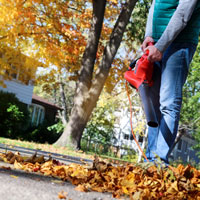Leaf Blowers Bring Unforeseen Risks
 With fall almost upon us, the leaves have begun to change colors – beautiful red, yellow, and orange leaves eventually turn brown and fall to the ground. And while the process proves quitebeautiful, we eventually find them scattered across our sidewalks and lawns, creating a risk of slip and fall accidents. In such cases, the use of a leaf blower has become a major timesaver, blowing leaves into piles and making their collection all the easier. However, what many may not keep in mind is that the leaves themselves are not the only danger.
With fall almost upon us, the leaves have begun to change colors – beautiful red, yellow, and orange leaves eventually turn brown and fall to the ground. And while the process proves quitebeautiful, we eventually find them scattered across our sidewalks and lawns, creating a risk of slip and fall accidents. In such cases, the use of a leaf blower has become a major timesaver, blowing leaves into piles and making their collection all the easier. However, what many may not keep in mind is that the leaves themselves are not the only danger.
What many people may not know is that leaf blowers come with their own set of dangers. In fact, many cities have considered banning them all together. Last year, two different manufacturers recalled more than 150,000 leaf blowers due to defects that pose risk of injury.
Leaf blowers can be more or less dangerous depending on the type of fuel used. Available in corded electric, battery-powered, and gas-powered versions, their noise and potential for pollution makes their use questionable.
A Nuisance of Noise
There is no denying that leaf blowers can make quite a bit of noise. The more powerful the leaf blower, the louder the noise it makes. Aside from just being annoying, if you do not take steps to protect your hearing, the noise can contribute to hearing loss. According to the advocacy group Citizens League for Environmental Action Now, gas-powered leaf blowers can emit noise above 90 decibels, which is much higher than the level of what would still protect the user’s hearing. Even the quietest models of leaf blowers create noise that can be extremely aggressive for those nearby. That is why many areas have passed and continue to pass laws that restrict their use.
Leaf Collection, Pollution Dispersion
Regardless of the make and model, all leaf blowers pose the danger of air pollution. Not unlike cars, gas-powered leaf blowers give off pollutants, and their engines create distressing odors. Though electric leaf blowers are not the same, their ability to blow debris and materials such as animal feces into the air makes them inherently dangerous. Though you may not be able to see the debris, it ends up on clothing and other materials and can be easily breathed in. Battery-powered leaf blowers, which also do not emit pollutants, still contribute to the issue of toxic battery disposal, in which discarded batteries can lead to the pollution of soil and groundwater.
Physical Injuries
Even though leaf blowers feel much easier than raking up an abundance of leaves, handheld and backpack-style ones can weigh more than 25 pounds. The act of just holding one for long periods of time can create or help contribute to arm and back problems. Those leaf blowers on wheels, which do not require being held, can weigh over 100 pounds and still require the user to pull them everywhere.
A Risk of Fuel Leaks, Fire, and Burns
Gas-powered leaf blowers, which use both gas and oil to operate, run the risk of their fuel exploding and causing a fire. It is extremely important to store the fuel for these leaf blowers correctly and always double-check the spark plug boot inside of them to prevent a fire. Leaf blowers can also become increasingly hot as they are used, with prolonged use even running the risk of melting the casing. When this happens, they can become very hot and run the risk of burning individuals who touch them.
Leaf blower injuries are not to be taken lightly. When these injuries occur, the victim can often face severe physical and emotional pain. This is not to mention the exorbitant cost of hospital bills and sometimes even ongoing rehabilitation. Though sometimes these injuries may be attributed to incorrect use, often times the manufacturer is to blame. These problems with the product itself must be proven for the manufacturer to be held liable for the injury.
New Jersey Product Liability Lawyers at Eichen Crutchlow Zaslow, LLP Help Those Injured by Leaf Blowers Claim Compensation
If you or a loved one has been injured in a leaf blower accident, contact the experienced New Jersey product liability lawyers at Eichen Crutchlow Zaslow, LLP today at 732-777-0100 for a free consultation. You can also contact us online. We have offices in Edison, Red Bank, and Toms River, New Jersey to assist individuals throughout the state.

Eichen Crutchlow Zaslow, LLP has purposely remained small in size, because it is important to us that we get to know our clients and their needs. Larger NJ injury firms may churn out case after case, but that’s not how we operate. Partners Barry Eichen, William Crutchlow, and Daryl Zaslow have created a firm with the resources to handle complex litigation, and a team that takes your case personally.
Find out more about Eichen Crutchlow Zaslow, LLP
